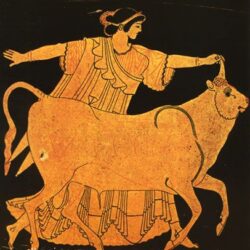While reading Levi’s account of facing death and arriving at Auschwitz, I was presented with complex emotions and deeply troubling scenarios. The last paragraph on page 21 stood out to me for this reason. Levi describes a situation where the German guard in his lorry “courteously” asked each prisoner if they had anything of value to offer him. Levi continued to explain that it was not a requirement, but “a small private initiative of [their] Charon” (Levi, 21). The last sentence reads, “The matter stirs us to anger and laughter and brings relief” (Levi, 21). I found this particularly interesting because it points towards the idea of what little humanity people had left in this situation. I wanted to point out that the guard acted of his own accord to request money and valuables from the prisoners, which was not necessarily a part of his explicit orders. I feel that this brought the prisoners relief because they became fully aware of their situation as they were being robbed of their humanity and treated as “pieces”, just as the guard exercised his humanity to ask for “donations”.
(This is not necessarily a question, rather a conversation-starter on the topic of humanity in Survival in Auschwitz)

Europe’s Long 20th Century (HIS270 S21)
A Contentious Continent